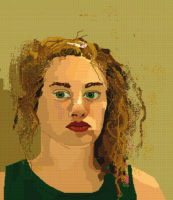Rachel B. Glaser is the author of the books Paulina & Fran (a novel), Pee on Water (short stories), and MOODS (poetry). Glaser, who won the McSweeney’s Amanda Davis Fiction Award in 2013, has been anthologized in 30 Under 30 and New American Stories. Also a visual artist, she studied painting at Rhode Island School of Design before graduating from UMass-Amherst’s MFA program.
NEW LOCATION/TIME: Glaser will give a reading on Thursday, Feb. 16, at 8:00 p.m., at Athens Public Library.
By Olivia Cobb
Rachel B. Glaser writes powerfully, with the weight of a dozen dancers thrashing in the night. In her new novel Paulina & Fran, Glaser paints portraits of students carousing, she seriously discusses the impact of good curls, and she tests the weight of friendship. Under the surface of all the pulsing and self-involved collegeness of the novel, Glaser explores ego and the power of self-creation in a rollicking and affecting way.

“Self Portrait,” by Rachel B. Glaser
Paulina & Fran follows two young women as they grow in and out of their friendship from its start at a small-town art school. Is Paulina too big for the world, or is she trapped by how big the world is? Is Fran boring or brand-new? Readers accompany these characters through their hilarious, painful, real-life-messy stories.
In an interview with Vincent Scarpa of Electric Literature, Glaser describes a running automatic faucet, written into a scene toward the end of her novel, as “a monument for nothing.” Glaser’s characters in Paulina & Fran struggle with their urge to monumentalize all sorts of nothings, too, just as they struggle with their rushing desire to leave all sorts of marks on the world—whether through love or friendship. Through them, Glaser brazenly asks the question we all ask ourselves: are we important? The novel’s events, an endless stream of moments that leave the reader close to tears or hysterical laughter—which, in this case, might be just about the same thing—suggest that we are important, within limits. But that implied answer isn’t the point. The questions and the flailing of the memorable characters are what gives the novel its energy.
Glaser’s publications also include a collection of short stories called Pee on Water, and a poetry collection titled MOODS. She also is an avid painter, unexpectedly, of professional basketball players. Her work, both on canvas and page, carries a fresh confidence—one that is a great pleasure to meet for the first or millionth time. There are strange bumps and bruises that don’t seem strange, and characters that are so bizarre they fit in.
Paulina and Fran oozed into my mind like some odd ectoplasm that caused me to say, “I’ve never read anything like this before”; at the same time I experienced a sense of recognition and communion with these characters, and with the writer.
The opening line of the novel reads, “Paulina was dissatisfied with her lover,” and from that moment of Glaser’s direct writing onward, I shared none of that sense of dissatisfaction.



















Comments